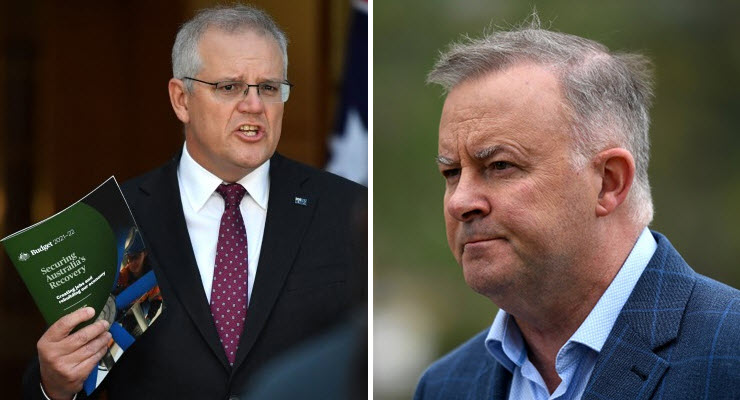The Coalition has unleashed a tsunami of borrowed money, crossing its fingers global growth will float the debt away. But it may not be all smooth sailing.
Scott Morrison’s second budget as a leader elected in his own right marks a historic moment in Australian history, and perhaps a footnote to world history.
The tsunami of borrowed money sent rolling towards favoured sectors — aged care, women’s safety — and allowing for tax cuts and direct grants to the corporate sector is a final abandonment of the notion of “prudence” that once underpinned the political right, both liberal and conservative. The government is betting that the global theorists are right: world growth will continue at its steadily expanding rate; the money supply will be reopened via quantitative easing as required; the price of credit will remain zero for years to come.
Whether it’s China that buys our iron ore or not, the world’s going to want it, so we may well be tailgating on global growth but we’ll get there nonetheless. Deficit spending on services that have been in the news, at the expense of infrastructure and productive resources — including education — will run down the national base, even as it piles up the debt depending on it.
Wages will be squeezed relentlessly and everyday savings worn down as the money floods in. But the low unemployment rate, the rush to the housing market, and the availability of ever-expanding resources of personal debt will both hide this decline or rely on changing patterns of cultural acceptance to avoid any sort of confrontation.
Ever greater global growth rates, related to ever-expanding automation, will float the debt away with the simple effect of time and reinvestment.
In response, the commentariat have near-unanimously concluded that Labor has nowhere to turn. This is to take politics as a one-dimensional, two-setting game. The right cuts spending, Labor opens it up. Well, it’s probably right about that too, but only because Labor accepted that framing some time ago and stopped offering any critique of what the Coalition was doing — essentially de-developing the country by killing any possibility of being a research and development country in order to kill the sectors it produces because they are reliably left-wing.
The Coalition wants a big, simple country, with a static education level, mid-level industries and a lot of un-value-added raw materials dug up and sold.

Despite all this, some in Labor believe it is in a far better position than polling and public image suggest. They believe there is more exasperation with Morrison et al than is showing up, that the Voices movement may play a small but crucial role in transferring preferences to them, and that there are very specific demographics who are responding to their message of fiscal restraint — basically older working-class voters, especially in the regions. Gone to the Libs for culture wars reasons, some, enough, will come back because the Libs are a rabble.
But beyond that they’ve got nothing to say, as became painfully obvious this week. They’ve eschewed any sort of narrative of how the economy works and how it should work. That would involve talking more about how much development should be paid by debt, how much by tax — on large non-paying corporations, not a few folks getting windfalls from franking. It involves talking about how the productive base relates to the creation of a society with more opportunity. Instead, they’ve presented the party as the better technocratic manager of a whole economic system, quite a different thing.
The crucial event in this was the creation of the Fair Work Commission in its current form, by a government of Labo(u)r lawyers so desperate to get industrial relations out of the hands of actual union memberships they were willing to risk a structure that the Coalition could stack. Which it duly did.
When we scream at them that the political success of the Hawke/Keating era was the willingness to make a case against the Coalition — based on its refusal to nation-build or attend to the productive base, as much as on redistribution — Labor insiders say that yeah, that was then. It was an era of big broadsheet newspapers that people read, long current affairs shows that people watched, big workplaces where people argued the toss, and so on. That world, they say, is gone. A broad mass of people attach to image, myth, moment. The “social” has disappeared as a horizon.
That does not mean people are simply individualistic economic calculators. But it does mean that the narratives of life are overwhelmingly individualistic, often drawing in notions of trauma, victimhood, tests of self, etc. Stories such as the Christine Holgate saga linger and represent in a way that even Keating-style concretised “banana republic” arguments don’t.
I don’t think that’s true. I reckon a lot of such insiders have fallen into a sort of “focus group” vicious circle, in which they continually adjust their framing to feedback sought within the terms of that framing. Which is why they have the appearance of a party going down the drain.
The other argument would be that you keep talking about the wrong sort of spending, that the wages squeeze is related to the wrong sort of spending, and that the anti-Labor forces are doing what the anti-Labor forces have been doing since Fusion in 1909: keeping us underdeveloped in every sense of the word, dependent on first the empire, then the Commonwealth, then the US alliance, and then in relation to the global economy as a whole, because they benefit when there is no conception of how readily things could be better, and cater to our desire to be better. Not more moral, but more fully, multidimensionally human.
Yeah, OK, I wouldn’t raise imperial preference on A Current Affair, but you get the drift.
That would not only have been a way Labor could have avoided the atomic wedgie it’s now getting. It would be a down payment on what happens if the whole global plan goes awry. After all, we’re getting into the realm of chaos theory here.
Global inflation could jump out of the mix like a quantum event, the exciting new world of cryptocurrency derivatives sounds oh so familiar, a war that got warm and then hot would play havoc, and we might wake up tomorrow and find that China, India and a few others have created a global reserve currency as an alternative to the greenback. And so on.
And the profit arrow of any system of galloping automation must be downward — which is why it is tilted back up by the state just giving money to corporations, using intellectual property laws to build multiple rents back into the necessary products of everyday life (Office 365 subscription, anyone?) and so on.
Such attempts to preserve existing social-economic relations by “wasting” borrowed money, i.e. burning through it on social programs, builds up unintended consequences, which eventually play havoc with pricing, and economic steering. On that Marx and Hayek agree. Which is certainly an interesting place to be.
Morrison has become a historically significant prime minister (poor old Tony, the great Christian knight of the Southland, turned into Arthur Fadden the Second, warm-up joke to the main act) by setting off the money tsunami. Now he is going to have to surf it.

Help us keep up the fight
Get Crikey for just $1 a week and support our journalists’ important work of uncovering the hypocrisies that infest our corridors of power.
If you haven’t joined us yet, subscribe today and get your first 12 weeks for $12.
Cancel anytime.
Peter Fray
Editor-in-chief of Crikey








